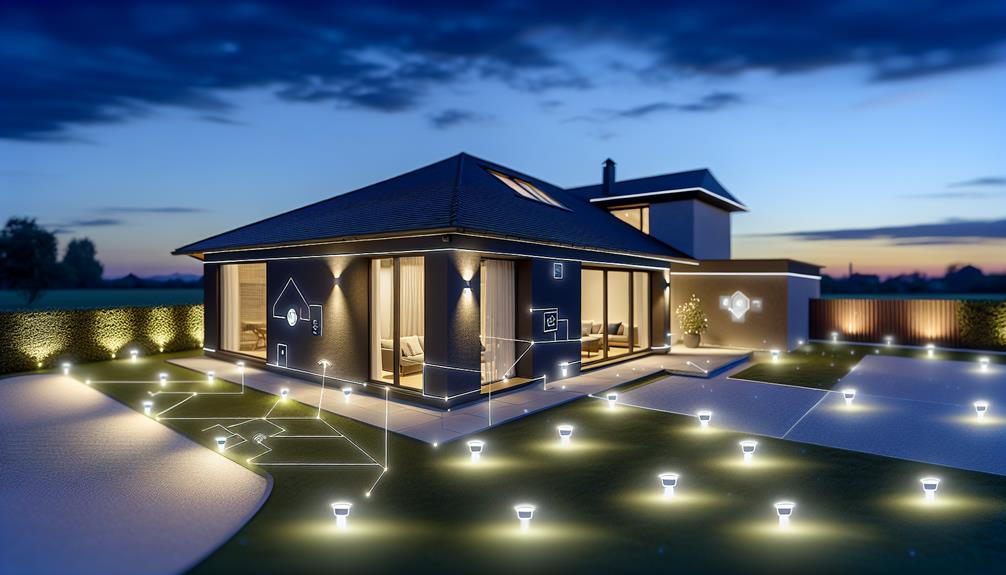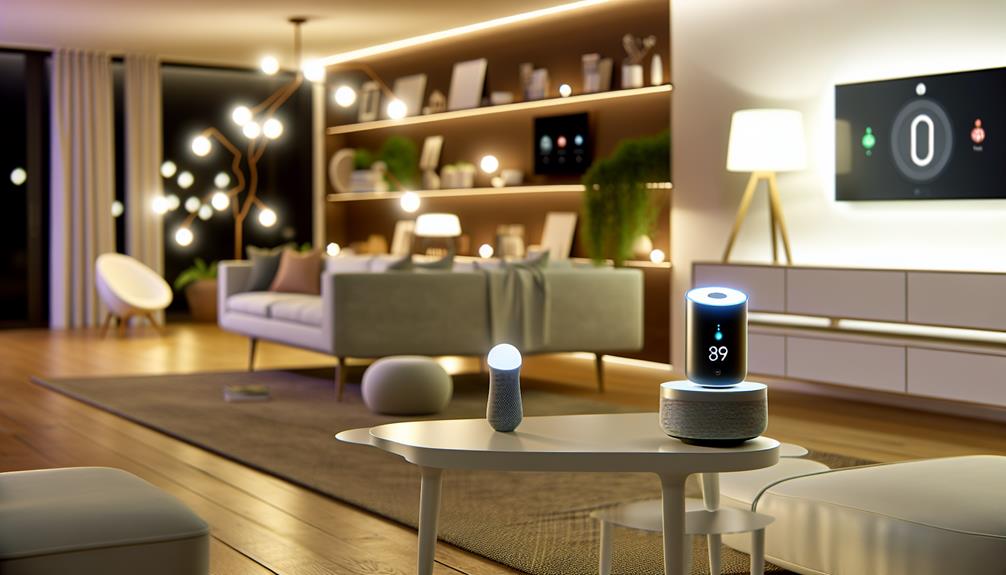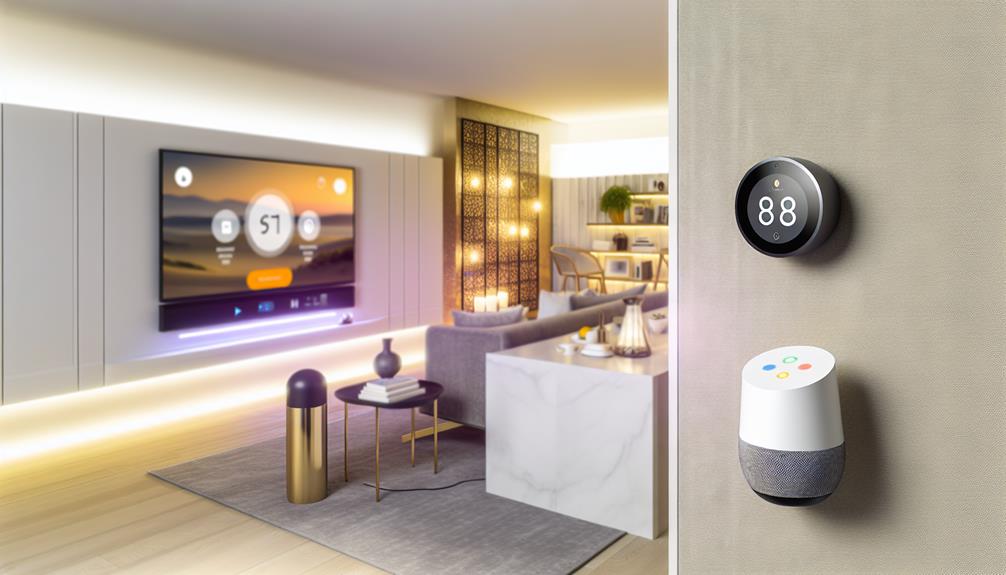Discover How AI Enhances Home Security Today
The integration of artificial intelligence in home security systems marks a significant evolution in how we protect our living spaces. With advancements in AI-powered surveillance cameras, smart doorbells, and intelligent alarm systems, homeowners can now benefit from features such as real-time monitoring and personalized security solutions. These technologies not only enhance safety but also raise important questions about privacy and regulatory measures. As we explore the various facets of AI in home security, it becomes essential to contemplate what implications these innovations hold for the future of personal safety and community well-being.
Key takeaways
- AI-powered surveillance cameras utilize advanced analytics to detect unusual activities, enhancing traditional security with real-time monitoring.
- Smart doorbells offer remote viewing and communication, using AI to differentiate between familiar faces and strangers for improved security.
- Intelligent alarm systems personalize security solutions by analyzing movement patterns, significantly reducing false alarms and integrating with other smart devices.
- Facial recognition technology enhances access control by identifying known individuals, providing immediate notifications for unrecognized faces to prevent potential threats.
- Real-time alerts and notifications ensure instant threat detection, promoting proactive security measures based on continuous behavioral analysis and customized alert preferences.
AI-Powered Surveillance Cameras
The integration of AI-powered surveillance cameras into home security systems represents a significant advancement in the ability to monitor and protect residential properties.
These sophisticated devices utilize AI analytics to provide real-time processing and interpretation of video data, allowing homeowners to detect unusual activities with remarkable accuracy. This proactive approach enhances the effectiveness of traditional security measures, as the cameras can distinguish between benign occurrences, such as pets or passing vehicles, and potential threats, such as intruders.
However, the deployment of AI surveillance technology does raise pertinent privacy concerns. Homeowners must navigate the delicate balance between enhanced security and the potential for intrusive monitoring.
The collection and storage of video data can lead to anxiety regarding who has access to this information and how it may be used. Additionally, regulatory frameworks surrounding data privacy are still evolving, leaving many questions unanswered about the ethical implications of constant surveillance.
Smart Doorbell Innovations
Innovations in smart doorbell technology have greatly transformed the way homeowners interact with their front entrances and enhance overall security. The advent of video doorbells has empowered users to see and communicate with visitors remotely, markedly increasing the sense of safety and connectivity. These devices utilize high-definition cameras combined with advanced motion detection, ensuring that homeowners are alerted to any activity at their doorsteps.
Moreover, the integration of smart notifications has revolutionized the user experience. When someone approaches the door, homeowners receive real-time alerts on their smartphones, allowing them to respond instantly, whether they are at home or miles away. This feature not only deters potential intruders but also fosters a greater sense of community by enabling users to engage with delivery personnel and guests, even when they are not physically present.
Additionally, many video doorbells now come equipped with artificial intelligence capabilities, allowing them to distinguish between familiar faces and strangers. This further enhances security, as users can receive tailored notifications based on the identity of the visitor.
Intelligent Alarm Systems
Building on advancements in smart home technology, intelligent alarm systems have emerged as a pivotal component in enhancing residential security. These systems leverage artificial intelligence to provide personalized security solutions that adapt to the unique needs of each household. By analyzing patterns of movement and behavior, intelligent alarm systems can differentiate between normal activities and potential threats, markedly reducing false alarms.
User-friendly interfaces are a hallmark of modern intelligent alarm systems, allowing homeowners to monitor and control their security with ease. Through smartphone applications and voice-activated devices, users can receive real-time alerts, access live video feeds, and manage alarm settings remotely, fostering a sense of connection and control over their home environment.
Moreover, integration with other smart home devices guarantees a cohesive security ecosystem. The capacity to customize alarm settings based on personal preferences empowers users to tailor their security experience, reinforcing a feeling of safety and belonging in their living spaces.
As technology progresses, the potential for intelligent alarm systems to enhance residential security continues to grow, making them indispensable in the pursuit of a secure and comfortable home.
Automated Lighting Solutions
Automated lighting solutions greatly enhance home security through the integration of smart motion sensors that detect movement and activate lights accordingly.
These systems often feature remote control capabilities, allowing homeowners to manage lighting from anywhere, thereby providing an additional layer of protection.
In addition, energy efficiency benefits arise from the intelligent design, reducing unnecessary energy consumption while maintaining ideal security levels.
Smart Motion Sensors
Utilizing smart motion sensors in home security systems greatly enhances safety and convenience by providing responsive lighting solutions. These sensors detect movement within a designated area, activating lights to illuminate pathways and deter potential intruders. This immediate response not only enhances visibility but also fosters a sense of security for homeowners, especially during nighttime hours.
The integration of wireless connectivity allows these motion sensors to communicate with other smart home devices, creating a cohesive security network. For instance, when motion is detected, the system can trigger outdoor lights, alert homeowners via smartphone notifications, or even connect to security cameras for real-time monitoring. This interconnected approach guarantees that homeowners remain informed and in control of their security environment.
Moreover, the consideration of user privacy is paramount. Smart motion sensors are designed to respect personal boundaries, focusing solely on relevant areas of movement while minimizing unnecessary data collection.
This balance between advanced security features and user privacy not only enhances the efficiency of home security systems but also establishes trust among users, inviting them to embrace the benefits of modern technology in safeguarding their homes.
Remote Control Features
Remote control features in home security systems offer significant advancements in automated lighting solutions, allowing homeowners to manage their lighting environments seamlessly and effectively.
With the integration of AI technology, the user interface provided through mobile apps empowers users to customize their lighting based on personal preferences and security needs.
Key benefits of these remote control features include:
- Scheduled Lighting: Homeowners can set specific times for lights to turn on or off, simulating occupancy and enhancing security.
- Real-Time Control: The mobile app allows instant adjustments to lighting, ensuring that any unexpected situation can be addressed promptly.
- Scene Creation: Users can create specific lighting scenes for different occasions, enhancing both ambiance and security by adapting to various scenarios.
The user-friendly mobile app enhances the overall experience, enabling homeowners to monitor their environments from anywhere.
This level of control not only fosters a sense of belonging within the community by promoting safer neighborhoods but also reinforces the idea that technology can enhance daily life.
As homeowners embrace these advanced features, they can enjoy the peace of mind that comes from a well-lit, secure home environment.
Energy Efficiency Benefits
As homeowners increasingly prioritize sustainability, the integration of energy-efficient automated lighting solutions has emerged as a critical component in modern home security systems. These systems not only enhance safety but also considerably reduce energy consumption, aligning with a growing commitment to sustainable technology.
Automated lighting solutions utilize smart sensors and timers to guarantee lights are only activated when needed. This feature minimizes unnecessary energy use, which is particularly beneficial for households aiming to lower their carbon footprint. For instance, motion-activated lights can deter potential intruders while simultaneously conserving energy by shutting off after a designated period of inactivity.
Moreover, many automated lighting systems can be integrated with smart home platforms, allowing homeowners to control their lighting remotely or set schedules that coincide with their daily routines. This capability not only amplifies convenience but also assists in energy management, making it easier for families to adopt eco-conscious practices.
Incorporating these technologies fosters a sense of community belonging, as homeowners collectively contribute to a more sustainable future while enhancing their security.
Ultimately, energy-efficient automated lighting solutions provide an effective means to balance safety and environmental responsibility.
Real-Time Alerts and Notifications
Real-time alerts and notifications are integral components of modern AI-enhanced home security systems, facilitating instant threat detection.
These systems utilize advanced algorithms to identify potential security breaches, allowing homeowners to respond swiftly to potential dangers.
Additionally, the ability to customize alert preferences guarantees that users receive notifications tailored to their specific security needs and lifestyles.
Instant Threat Detection
Implementing AI-driven systems for instant threat detection greatly enhances home security by providing timely alerts and notifications.
These advanced systems leverage behavioral analysis and anomaly detection to identify potential threats in real-time, ensuring homeowners can respond promptly to unusual activities within their premises.
Key features of instant threat detection include:
- Real-Time Monitoring: Continuous surveillance allows AI to analyze behaviors and detect anomalies that deviate from established patterns, such as unexpected movements or unfamiliar faces.
- Instant Notifications: Upon detecting a potential threat, the system sends immediate alerts to homeowners via mobile applications or smart home devices, enabling swift action.
- Enhanced Decision-Making: With accurate data on behavioral trends, homeowners can make informed decisions about their security measures, fostering a sense of community and safety.
Customized Alert Preferences
Customized alert preferences allow homeowners to tailor their notification settings based on individual security needs and lifestyle choices, ensuring a more personalized approach to home protection.
With advancements in AI technology, systems now offer personalized security settings that adapt to unique user requirements, fostering a sense of belonging and community among users.
Homeowners can easily configure real-time alerts and notifications through user-friendly interfaces, which simplify the setup process, making it accessible even for those without technical expertise.
These interfaces enable users to select preferred alert types, such as motion detection, door access, or environmental hazards, ensuring they only receive notifications pertinent to their specific situation.
Furthermore, AI algorithms can learn from user interactions, refining alert preferences over time to enhance relevance and reduce false alarms.
This adaptability not only improves user satisfaction but also cultivates trust in the security system, as homeowners feel more in control of their environment.
Facial Recognition Technology
Increasingly, facial recognition technology is becoming a vital component in modern home security systems. This advanced technology leverages artificial intelligence to identify individuals based on their facial features, enhancing security measures in unprecedented ways.
However, the implementation of such technology does raise significant privacy concerns and ethical implications that warrant careful consideration.
The advantages of facial recognition in home security include:
- Enhanced Access Control: Homeowners can grant access to known individuals while denying entry to strangers, improving overall safety.
- Real-time Alerts: Immediate notifications can be sent to homeowners if an unrecognized face is detected, allowing for proactive responses to potential threats.
- Integration with Surveillance: Coupled with cameras, facial recognition technology can create a thorough security network that monitors activity around the home.
Despite these benefits, it is essential to address the potential risks associated with data misuse, surveillance overreach, and the accuracy of the technology.
As we embrace sophisticated security solutions, we must also prioritize transparency and ethical standards to foster trust within our communities.
Balancing innovation with respect for privacy will define the future of home security.
Integration With Smart Home Systems
The integration of facial recognition technology within smart home systems represents a significant advancement in home security. This technology enhances the ability of smart devices to identify authorized individuals, thereby reducing the risk of unauthorized access.
With voice assistant integration, users can effortlessly interact with their home security systems, issuing commands and receiving real-time notifications about potential threats.
Home automation compatibility further amplifies the benefits of this integration. By synchronizing facial recognition capabilities with other smart home devices, such as cameras, locks, and alarms, homeowners can create a cohesive security ecosystem.
For instance, when the system recognizes a familiar face, it can automatically open the door, while simultaneously disarming the security alarm. Conversely, if an unknown individual is detected, the system can alert the homeowner and initiate lockdown procedures.
Moreover, these systems can be customized to respond to specific scenarios, enhancing user experience and fostering a sense of safety.
As technology continues to evolve, the seamless integration of facial recognition with smart home systems will redefine home security, making it more intuitive, responsive, and reliable for families seeking to enhance their protective measures.
Frequently Asked Questions
How Does AI Improve Home Security Beyond Traditional Methods?
Like a vigilant guardian, AI enhances home security through facial recognition and behavioral analysis, enabling systems to identify intruders and assess unusual activities, thereby providing a proactive approach that surpasses traditional security measures.
Are AI Home Security Systems Expensive to Install and Maintain?
AI home security systems typically involve higher installation costs due to advanced technology. However, ongoing maintenance fees can be lower compared to traditional systems, as AI reduces the need for frequent manual interventions and updates.
Can AI Security Systems Reduce False Alarms?
AI security systems greatly enhance false alarm reduction through smart recognition technologies. By accurately distinguishing between genuine threats and benign activities, these systems improve overall security effectiveness, fostering a sense of safety and trust among homeowners.
What Happens if the Internet Goes Down?
Approximately 30% of security breaches occur during internet outages. Offline security systems can maintain functionality, employing emergency protocols such as local alarms and manual monitoring, ensuring continued protection even when online connectivity is compromised.
Is My Privacy Compromised With AI Security Technologies?
The integration of AI security technologies raises significant privacy concerns, as data protection measures must be rigorously implemented. Without proper safeguards, sensitive personal information may be vulnerable to unauthorized access, highlighting the need for vigilant oversight.



